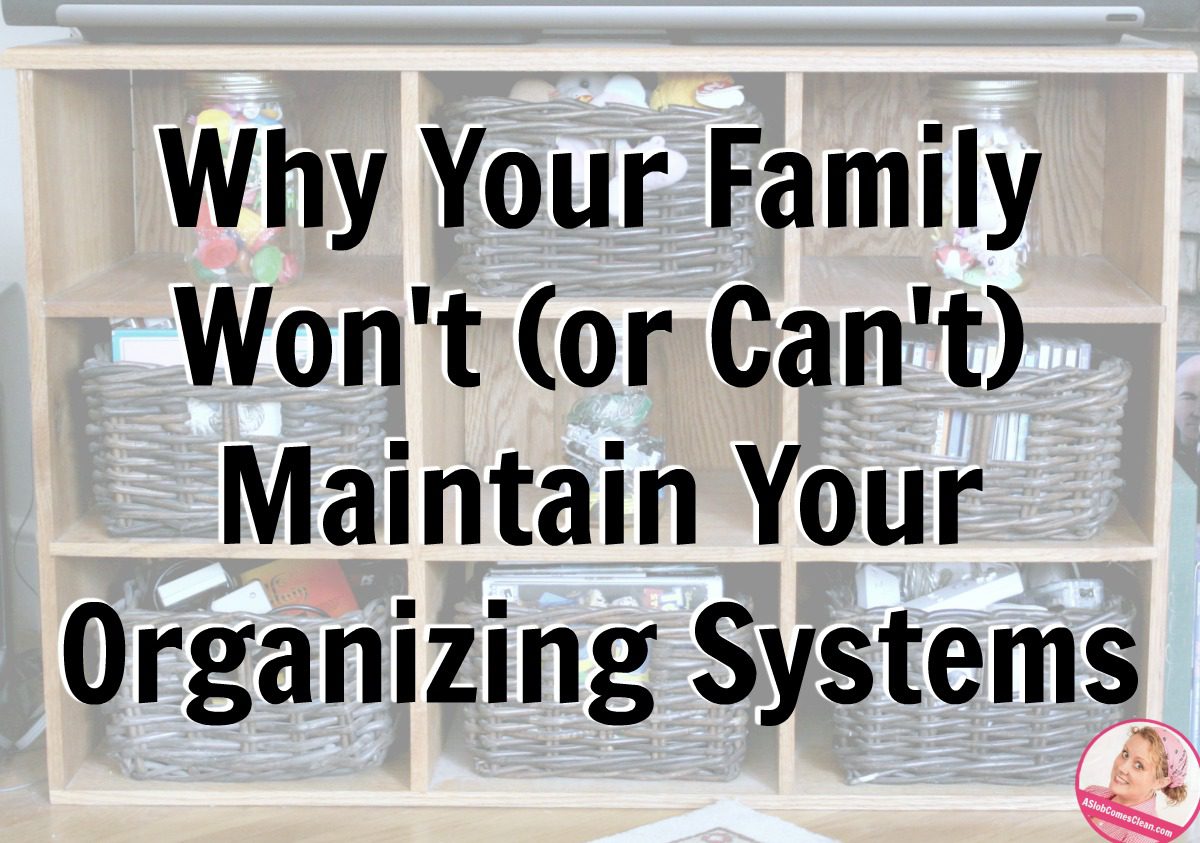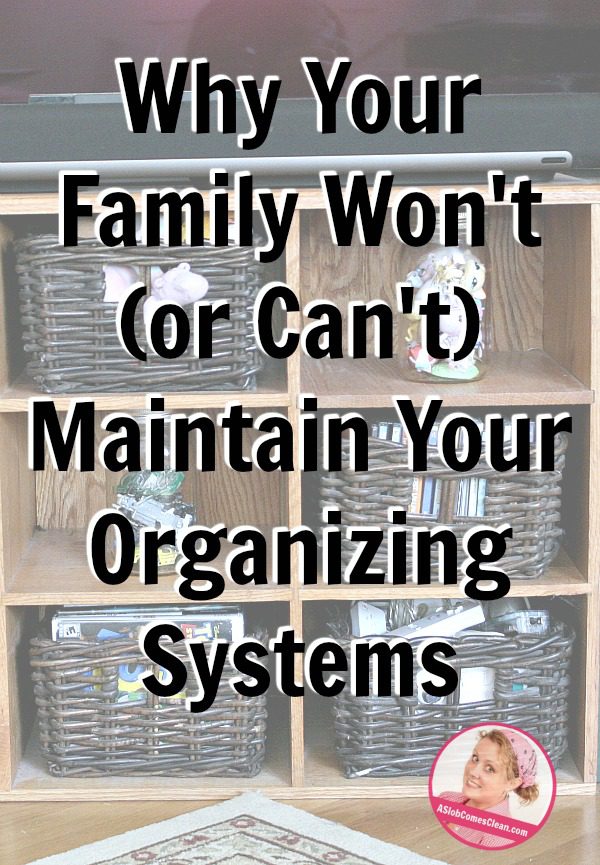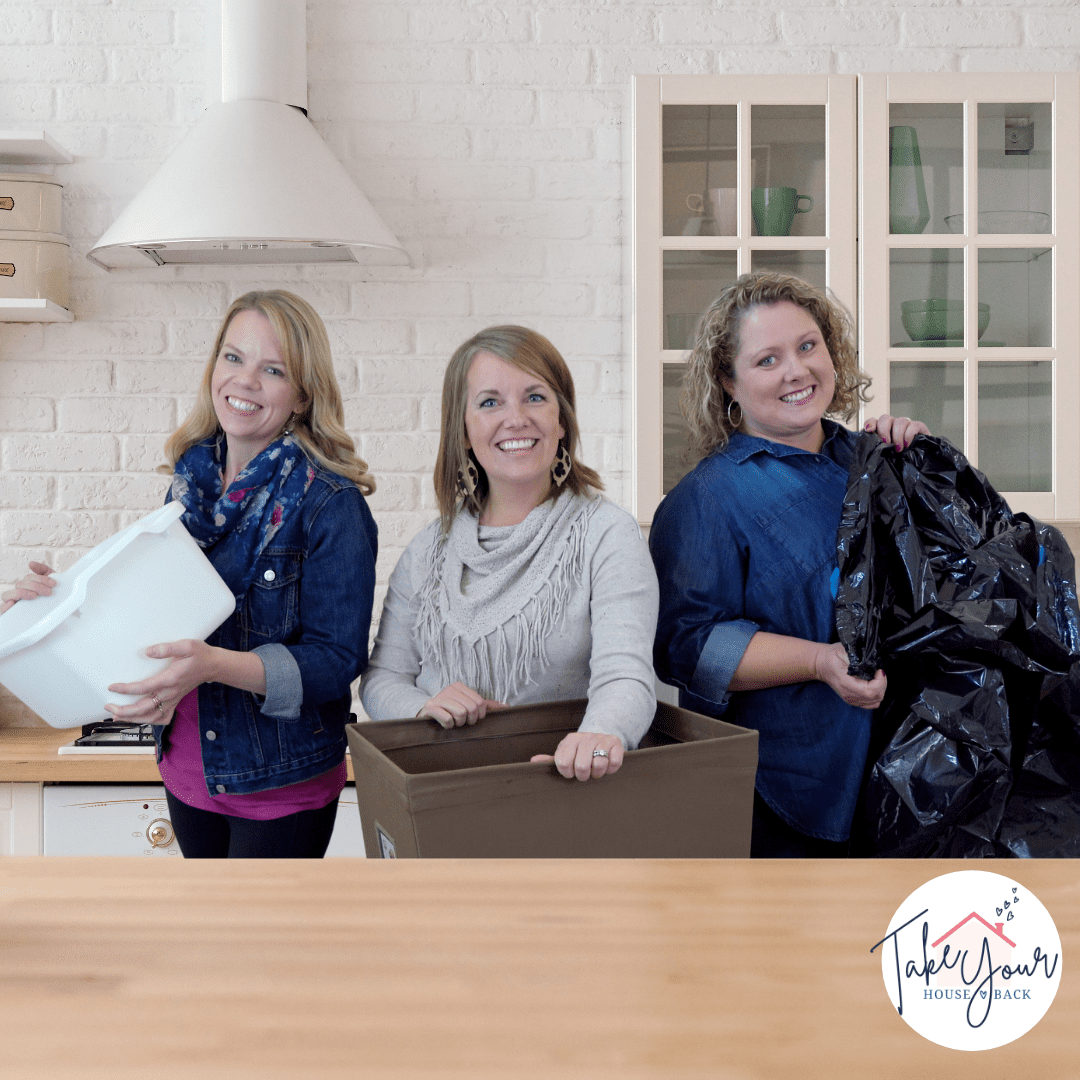
I hear from people all the time about their frustrations over family members sabotaging their organizing efforts. They put organizing systems in place, but other people living in their home don’t (or can’t) keep them up.
When I get these questions, I always feel a little awkward.
Like, maybe they didn’t notice the name of this site.
Because when people start complaining about how other people just can’t seem to get (or keep) it together, I know I’m that person. The one who can’t keep it together.
Not that I don’t understand both sides. I’m a mom. I get it.
My answer has always been to focus on yourself and what you’re doing (and not doing) first. Put systems in place and maintain them on your own (to work out the kinks) before bringing your family in on things.
But . . . I recently had a huge moment of understanding brought about by a comment on this post about how lovely it was to have the space available to move things around.
I couldn’t understand why my full cupboards got so messy from others. My husband explained that my cupboards were like playing tetris and no one had time for that game. So, I started weeding them out with everything I learn from you. Where I have successfully weeded my cupboards stay nice and my family helps. Where things are very crowded there is mess and back up and no help. Hmmmm. Less really is more. More help! Thank you, Nony!
Oh. My. Word. Lightbulb moment.
All I can say is YES!!!
Andrea’s husband explained it so well.
Let’s Define Clutter
My definition of clutter is anything that consistently gets out of control in my home.
MY home is the key.
If a space is constantly going back to a state of chaos, there’s too much stuff in that space. When I realized/created this definition of clutter, I started making progress, both in decluttering and maintaining my home. I stopped worrying about how to best fit in all my stuff, and started reducing how much there was. The more I removed from a space, the easier that space was to maintain.
If I need to get something out of a cabinet and I have to dig and shift and rearrange other stuff to get to the thing I need, that’s a pain.
And I almost never think or have time to (or think I have time to) put everything back in place once I find what I’m looking for.
But if I just declutter the cabinet (not create complicated organizing systems with the goal of keeping more stuff), the less digging and shifting and rearranging I have to do to find what I need.
This makes the cabinet look and function more organized. Just by decluttering.
But how does this apply to your family?
Find Your Family’s Lowest Common Clutter Threshold
Clutter Threshold is a term I made up to explain why some people can handle having more stuff in their home than others.
Every person’s Clutter Threshold is different. It’s personal. Some people can have a lot of stuff and keep their homes under control, but if I try to have a lot of stuff in my home, it looks like a tornado hit my house.
I can’t handle having a lot of stuff in my home, even though I wish I could.
I found my personal Clutter Threshold through decluttering, and realized it was a thing only after I’d reached it.
When I declutter a cabinet or a closet or a room to the point where it stays under control easily, I’m under my Clutter Threshold in that space.
Multiple family members living together in a home means there are different people with different Clutter Thresholds.
Shared spaces will only stay under control when they reach the Lowest Common Clutter Threshold for the people who use that space.
How do you find this Lowest Common Clutter Threshold?
You can only find your family’s Lowest Common Clutter Threshold for a specific space by decluttering that space. You can’t figure it out on paper.
Just declutter. Remove things that are not essential for the purpose of that space and see how long they can maintain it.
If it continues to get out of control, declutter some more.
And then maybe a little more.
One day, you’ll realize the space is functioning the way you want it to function, and you’ll all be happier.
A note for the despairing mama who wishes it would just work the way she wanted it to work when she bought the baskets and racks and systems: Finding the Lowest Common Clutter Threshold only matters in shared spaces. Spaces used only by you (a craft room or a tool bench or your own closet) only need to meet your own personal Clutter Threshold. You can use all the bins and cubbies you want to use in those spaces (as long as you can keep them under control easily).
Need help decluttering? My book, Decluttering at the Speed of Life, will teach you everything you need to know to make progress (and never a bigger mess) in your home. It’s available wherever books are sold in whatever format you prefer to use (paperback, digital, audio). Learn more here.
There’s also a lot of free information here on the site to get you started. Learn more about that here.
And not free, but on sale right now, my video course, The 5 Day Clutter Shakedown, is half off through the 31st! Find out more here.
Have you heard? I’ve teamed up with Cas from Clutterbug and Dawn from The Minimal Mom to bring you the course: Take Your House Back! Go check it out!


Yes! Yes yes YES! It’s amazing how much better kids are about picking up their toys when they have fewer toys. Thankfully, we had a fairly low clutter Christmas this year. We told people experiences over things and came away with very few physical things. And those we got are already being played with!
I have a question. I have cut back DRAMATICALLY the amount of dishes we now have, for the very reasons you addressed above. But my problem is that one family member will just keep taking plates, bowls, etc. to their room, and never bringing them back. It’s frustrating for the rest of us, and my husband will announce “we need to buy more bowls!” or whatever he cant find. Any suggestions for dealing with this?
Jan, perhaps you could fine the person who removes the dishes from the appropriate eating space? Some sort of inconvenience fee to pay to your husband for having to chase a dish down? I could even imagine a rental fee or deposit (a certain electronic device maybe?) that must be paid for any dishes that leave approved eating areas. Whether it’s a monetary thing deducted from allowance or a service like additional kitchen chores only you can determine what works best for your offender.
Give that person boundaries (eat only in the designated eating spaces or give the culprit color coded items,) or have them take paper products if leaving the designated area.) I will not buy anymore of anything. If it’s gone, it’s time to bring it back!
I kind of luck out in that I seem to have the lowest threshold for clutter in our house so when I organize an area it does stay that way. I’m also not afraid to keep trying and re-organize until it is perfect! I’ve learned to stay away from those areas that aren’t mine (like the kids’ bedrooms or my husband workshop) unless they ask for my help. Thanks for sharing with us at Encouraging Hearts and Home. Pinned.
Give each person their own set of dishes, this might mean purchasing more at the beginning but if each of you has their own design and NOT ALLOWED to use someone else’s then this should eliminate the problem (create a fine system for those found to use someone else’s – unless it is returned and washed up immediately so the owner isnt looking for it).
Pack up the dishes you have now and keep for guests only, so you have enough.
Dineen, that sounds like a great idea. I will have to try it.😍
It’s not always the kids.. my mom likes to dump everything out on the table to deal with later but never does
It’s definitely easier for all involved when there is less stuff, period. I love your insight!
What about the obvious, easier answer to Jan’s problem? You go & collect the dishes from their room & check what else is lurking in there. (I know you could ask the person to gather up the dishes & then wash them but presumably this hasn’t worked out) afterwards go back in their room & pick up trash & rubbish, dirty clothes off the floor into the washbasket, clear flat surfaces by placing their stuff in their desks/drawer & dusting, hoovering & opening windows to freshen up the room… because it’s your home they’re living in! Believe me, they will not leave dirty dishes in their room, ever again, God Willing! All without you saying a word,
Atia apparently didn’t quite “get it”. Even if the room is clean they WILL still continue the HABIT. The key is to break the habit by applying consistent consequences or there will be no change. I completely agree with Dineen. And it will work if you follow through with the consequences consistently. Good luck! You could start with just a rule that states no food in the bedroom, then stating the consequences for not doing so. If you do this though, the consequences must be followed up on, or your desired outcome won’t work. Think carefully about the consequences so you can achieve your goal. Again, good luck and let us know how it went! 🤗
Atia got it just fine. The offending child discovered they didn’t like someone cleaning their room (touching their stuff) and in order to stop it from happening again, they did not offend Mom by removing dishes from the kitchen again.
Thank you, Ann, for supporting Atia! Most teens do not like others “messing with their stuff.” If their mom inadvertently threw away something of theirs that held value to them, I believe they would think twice about not taking their dirty dishes back to the kitchen.
This would take me a week to do in my culprit’s room. It is well past up my knees.
That is what I was thinking about my teenagers’ rooms as well. And if I cleaned them for them they would just destroy them again. Trust me, I have tried it.
I do occasionally send them on dish and towel searches (or do my own rescue missions) for just the problem Jan described. If they are home I will get them to wash their own “crusty stack” but sometimes it is easier to just get them myself.
It is annoying, but eventually they will move out, right? My seventeen-year-old just came home complaining about all the dishes she did at her boyfriend’s house. Lol
What about a family that brings clutter into the house and into rooms that things do not belong in. For instance My husband constantly leaves tools all over the house. Boxes and plastic totes of paperwork in each room along with stacks of paperwork everywhere that usually end up scattered about. I am the only female in my house. They all leave clothes on the floors don’t bother to sweep or wipe up spills or throw away trash. I struggle to get my husband to even rinse dishes. They will get stuff out of the fridge or cupboard like cereal or butter and not put it away. Tooth paste tooth brushes everything is always left out. It isn’t until I flip out that anyone does anything but it’s a tension filled argument the entire time. That usually results in any help given being half asses for lack of a better term. I’m talking trash picked up and put in trash can but can overflowing all over the floor kinda stuff. I’m at my wits end w it all. Refusing to clean up and go on strike doesn’t work they don’t care or see a problem. Until they need something then they make a bigger mess in search for it and as u can imagine they don’t clean that up either.